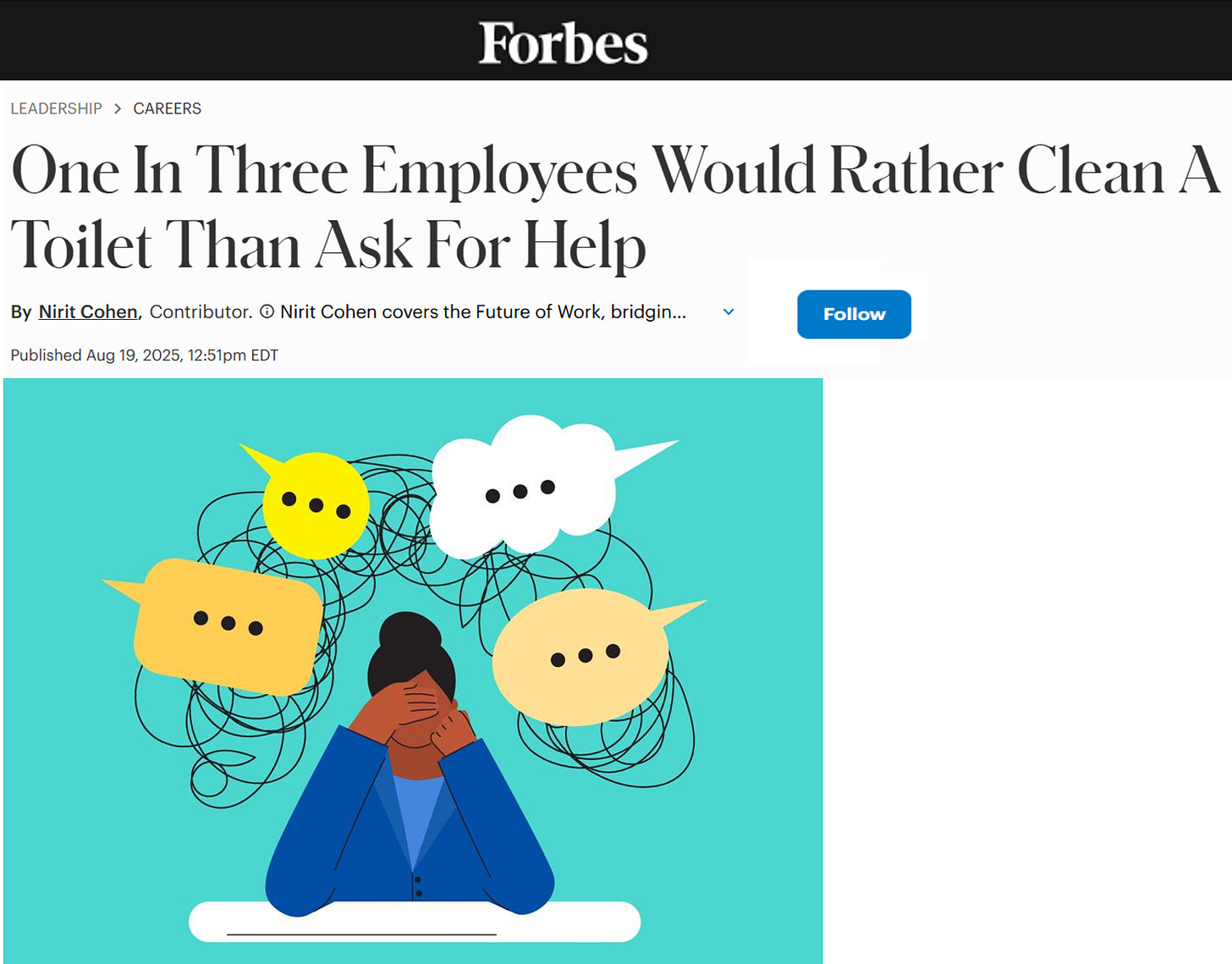One in Three Employees Would Rather Clean a Toilet Than Ask for Help
From awkward conversations to healthy disagreements, the skills workers avoid may be the very ones organizations need most in the age of AI to build communication and trust
Are We Losing Our Social Muscle at Work? We spend more time on Zoom than in hallways. We polish Slack messages instead of stumbling through conversations. We turn cameras off, edit emails, and curate personas that are safe but distant.
This week’s Thought Letter suggests that while AI will take over the easy tasks, the messy, human ones are what matter most for the future of work.
Served weekly with❤️,
Nirit
This article was initially published on Forbes»»
Nearly one in three employees admit they would rather clean a toilet than ask a coworker for help.
That startling finding comes from the Social Muscle Report, a 2024 Pryority Group study of workplace behaviors. On the surface, it’s almost humorous. But behind the laugh is a serious problem. The research points to a steady atrophy of “social muscle,” the everyday human skills of asking, connecting, and navigating discomfort.
This isn’t about toilets. It’s about a shrinking tolerance for social discomfort. And in the age of hybrid work, curated online personas, and AI-driven efficiency, those discomfort muscles may be the most important ones to strengthen for the future of work.
Awkwardness isn’t failure — it’s human
Henna Pryor, author of Good Awkward: How to Embrace the Embarrassing and Celebrate the Cringe to Become the Bravest You, recently discussed these ideas on The Future of Less Work podcast. Her research shows that awkwardness is not a flaw to eliminate but a universal part of human interaction.
Awkwardness often shows up in small, ordinary moments: asking a colleague for help, introducing yourself to someone new, or admitting you don’t know something. These exchanges are rarely smooth, but they are precisely the moments where trust, belonging, and growth are built. As Pryor explained: “When we're near each other, we inevitably do something wrong. We mispronounce a name, we have a typo in our presentation and in proximity, we're more likely to say, hey, just FYI, did you notice that?”
Remote work has stripped many of these opportunities away. After a Zoom meeting, we’re less likely to call that colleague and point it out. Slack messages can be rewritten, emails edited until perfect, cameras kept off. The over-polished persona removes risk, but it also removes the small stumbles that make us real to one another. Without those imperfect reps, our “discomfort muscles” weaken. The very moments that make people feel awkward, and human, are increasingly missing from work.
Those awkward micro-moments are how people grow. If a coworker responds generously to a request for help, the relationship deepens. If someone admits they don’t know something and learns from another, their competence grows. If a stumble is met with continued respect, the sense of belonging strengthens. Ultimately, growth doesn’t happen in the comfortable moments. It happens in the awkward ones, when you ask for help, admit you don’t know, or take a risk and survive it.
Disagreement is a feature, not a bug
If awkwardness is the warm-up, disagreement is the heavy lifting. And like any muscle, the ability to handle discomfort grows with practice. Justin Jones-Fosu, author of I Respectfully Disagree: How to Have Difficult Conversations in a Divided World, explored this theme on The Future of Less Work. He extends the idea from individual growth to organizational strength, emphasizing that disagreement is not dysfunction. It’s a feature of healthy teams. The absence of disagreement doesn’t mean health — it means brittleness.
Avoiding disagreement may appear to keep the peace, but as Jones-Fosu notes, it actually hurts us. Teams that never clash may look harmonious, but under pressure, they crack. Harmony is not health. Conflict avoidance doesn’t make organizations stronger; it makes them fragile. And when people go along to get along, deeper damage can follow. As Jones-Fosu explains: “We call that disrespectful agreement. Because I might agree with you in the moment, but I never share with you, I just disrespect you behind your back.” The result isn’t cohesion — it’s resentment.
Instead, people need the tools to handle disagreement constructively. When approached with skill and intention, conflict doesn’t push colleagues apart — it builds belonging. Teams feel safer when they know disagreement is not rejection but a pathway to stronger solutions.
In his book, Jones-Fosu outlines what he calls the Five Pillars of Disagreement: respect, curiosity, clarity, humility, and consistency. Respect means seeing the person rather than just the position. Curiosity asks to understand rather than to respond. Clarity requires honesty and precision. Humility accepts that one’s perspective may be wrong. And consistency means showing up the same way, every time, so others know what to expect.
These aren’t lofty ideals but everyday tools leaders can model and teams can practice. They are the road through discomfort, not around it.
Why this matters for the future of work
As AI automates more of the easy work — scheduling, optimizing, repeatable processes — what remains is the messy, deeply human work that machines cannot do.
AI does not feel awkward. It does not struggle to ask for help. It does not disagree.
That’s human work — and it’s our advantage.
Awkwardness and disagreement are not failures to be smoothed away. They are signals that something real, something human, is happening. They are the muscles of trust, growth, and innovation.
Leaders who normalize, practice, and reward discomfort will give their organizations the one edge technology cannot replicate.
Your Turn:
How do you keep your “social muscle” strong in a digital-first workplace?
Served weekly with ❤️,
Nirit


